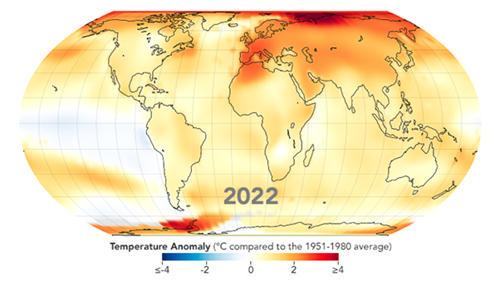
This week’s update is written by Sam Dovey, who is in our discretionary investment team in Guernsey.
The heat we experienced over the weekend of the 24/25th June was, in one word, “scorchio”. As a person who likes to be outside and potter around, it was even a little too hot for me!
As we all enjoyed, or indeed moaned, about the heat to varying degrees, this made me think about global warming and the Paris Agreement of 2015 which was agreed at COP21 in Paris (signed in November 2016).
For those that may not know, the Paris Agreement sets out a global framework to avoid dangerous climate change by limiting global warming to well below 2°C and pursuing efforts to limit it to 1.5°C.
The problem is, there is now a 66% chance that we will see a year with warming above 1.5°C degrees by 2027.
Whilst things for “us” (as in Northern Europeans or the UK) may not change so much on a day-to-day basis, it will have catastrophic consequences for people living in the hardest hit parts of the world and will bring more unpredictable and extreme weather patterns for all of us.
Meteorologists expect heatwaves to be fiercer, droughts longer, wildfires more frequent and rainstorms heavier. For example, Canada is experiencing its worst fire season in modern history, as many of us will be aware of due to the smoke-filled clouds that made their way down to New York in the first week of June making headlines around the world.
However, the impact of rising temperatures could be life threatening in some regions. This is particularly apparent in the Arctic, where the region is heating up four times faster than the rest of the planet.


This extreme warming has had a huge impact on the local populations, as the ice formations become more unstable, which hinders traditional pursuits such as hunting and fishing, which many rely on as a source of food. Unstable ice packs also impact the ability to move across the region, as they form later and break up earlier, so travel becomes inherently dangerous.
The threat caused by melting ice will reverberate around the world; not only is Artic meltwater expected to increase global sea levels by 0.26 to 0.77 meters by the end of the century, but the volume of the ocean is also increasing as the water warms (as the water temperate rises, the molecules move faster and therefore take up more space). This makes the outlook far worse at 2°C.
As an islander, rising sea levels are a concern. I live 50m above sea level, but if you live down on the west coast in Guernsey, at Vazon for example, in places this is only 1m.
The more extreme weather conditions will also wipe out crops, exacerbating both food and water shortages, and food scarcity becomes a real issue in a hotter world. We have several funds that access these particular problems in our thematic fund Global Solutions. There is substantial exposure to waste, water as well as food and nutrition. These funds invest in companies that address these issues head on.
There is no magic temperature threshold in which the world is doomed and crossing the 1.5 degrees threshold is a political milestone, rather than a scientific one. In reality, 1.4°C is better than 1.5°C, whilst 1.7°C is better than 2°C.
If you think about it in another way, the UK national speed limit is 70mph, it doesn’t mean 69 mph is safer or that 71mph will kill you – but the faster you go the more danger you are in.
But life is not all bad, as we know man is a great innovator and with the 1.5°C temperature goal slipping out of reach, this means those problem solvers and enablers are even more galvanised to act and the runway for investment is huge. This long-term investment theme can be accessed directly via our Ravenscroft Global Solutions Fund.
Now, where’s that factor 50…

